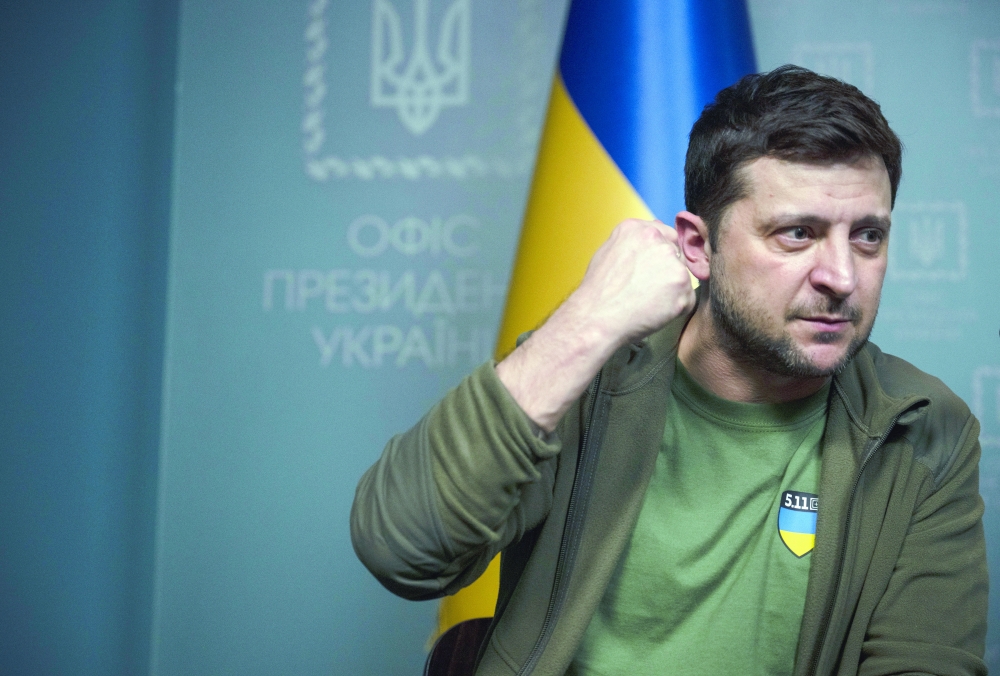

Why do we admire Volodymyr Zelensky? The question almost answers itself.
We admire him because, in the face of unequal odds, Ukraine’s president stands his ground. Because he proves the truth of the adage that one man with courage makes a majority.
Because he shows that honour and love of country are virtues we forsake at our peril. Because he grasps the power of personal example and physical presence. Because he knows how words can inspire deeds — give shape and purpose to them — so that the deeds may, in turn, vindicate the meaning of words.
We admire Zelensky because he reminds us of how rare these traits have become among our own politicians.
Zelensky was an actor who used his celebrity to become a statesman. Western politics is overrun by people who playact as statesmen so that they may ultimately become celebrities. Zelensky has made a point of telling Ukrainians the hard truth that the war is likely to get worse — and of telling off supposed well-wishers that their words are hollow and their support wanting. Our leaders mainly specialise in telling people what they want to hear.
We admire Zelensky because of who and what he faces. Vladimir Putin represents neither a nation nor a cause, only a totalitarian ethos. The Russian ruler stands for the idea that truth exists to serve power, not the other way around, and that politics is in the business of manufacturing propaganda for those who will swallow it and imposing terror on those who will not. Ultimately, the aim of this idea isn’t the mere acquisition of power or territory. It’s the eradication of conscience.
We admire Zelensky because he has restored the idea of the free world to its proper place. The free world isn’t a cultural expression, as in “the West”; or a security concept, as in Nato; or an economic description, as in “the developed world.”
And the responsibility of the free world is to aid and champion any of its members menaced by invasion and tyranny. As it goes for Ukraine, so, eventually, it will go for the rest of us.
We admire Zelensky because he embodies two great Jewish archetypes: David in the face of Goliath and Moses in the face of Pharaoh. He is the canny underdog who, with skill and wits, makes up for what he lacks in fearsomeness and brawn. And he is the prophet who revolts against the diminishment and entrapment of his people — and determines to lead them through trials toward a political culture based on self-determination, freedom and ethics.
We admire Zelensky because he fights. Fighting is not supposed to be a virtue in civilised societies that value dialogue, diplomacy and compromise. But the world isn’t always civilised: There are things for which civilised persons and nations must be prepared to fight if they aren’t to perish. Zelensky and the Ukrainian people have reminded the rest of the free world that a liberal and democratic inheritance that is taken for granted by its citizens runs the risk of being taken at will by its enemies.
We admire Zelensky because he rouses the better angels of our nature. His leadership has made Joe Biden a better president, Germany a better country, Nato a better alliance.
We admire Zelensky because he maintains a sense of human proportion befitting a democratically elected leader. Note the contrast between his public encounters with journalists, Cabinet members, foreign leaders and ordinary citizens and the Stalinist antics of the Putin court.
We admire Zelensky because he models what a man should be: Impressive without being imposing; confident without being cocksure; intelligent without pretending to be infallible; sincere rather than cynical; courageous not because he is fearless but because he advances with a clear conscience. American boys in particular, raised on preposterous notions of what manhood entails, should be steered towards his example.
— The New York Times
Bret Stephens
The writer is a Pulitzer Prize-winning US journalist, editor and columnist
Oman Observer is now on the WhatsApp channel. Click here



